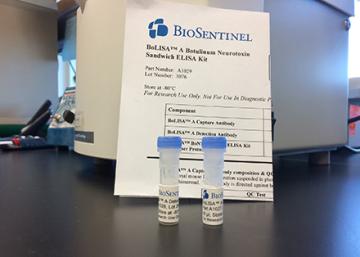Better Test, Greater Safety

ARS technology was chosen for use in this test for botulinum toxin. (Photo courtesy of BioSentinel, Inc.)
Have you ever heard of dystonia? It’s a medical disorder where muscles contract uncontrollably, causing parts of the body to twist involuntarily. Dystonia affects about 1 percent of the population, and women are more likely to have it than men. Dystonias are frequently treated with drug products that contain botulinum toxin, such as Botox, which is better known by the public for its abilities as a therapeutic wrinkle smoother.
Every single batch of Botox must be checked for safety before it can leave the plant, no matter the use for which it is intended. And that’s where the Agricultural Research Service (ARS) came in.
An ARS scientist developed monoclonal antibodies—proteins based on an immune cell that detects and binds only to a specific target—that screen for botulinum toxin. They are now a part of a test kit sold by BioSentinel, Inc., of Madison, Wisconsin.
Botulinum toxin, which is produced by the bacterium Clostridium botulinum, can also cause botulism poisoning in people, most commonly from eating improperly canned foods. In addition to serving as a factory screening test, the kit can be used by food safety agencies during a food poisoning incident to identify and track the strain back to its source. There is also concern about the toxin’s potential to be used by bioterrorists.
The kit replaces the previous way to assess pharmaceutical batches of Botox for purity and identity, which often involved animal testing. The kit also is faster, more precise, and less expensive.
BioSentinel’s Director of Research and Development Ward Tucker said they looked at about 60 different monoclonal antibodies, and ARS’s product was far superior than any of others, so they chose it for the test kit.—By Kim Kaplan, ARS Office of Communications.

